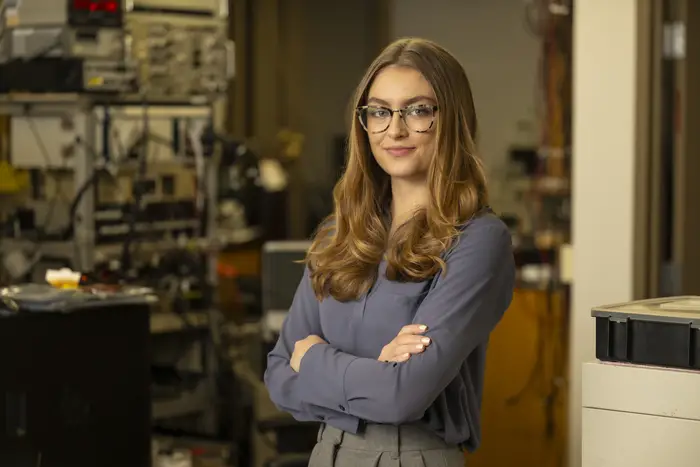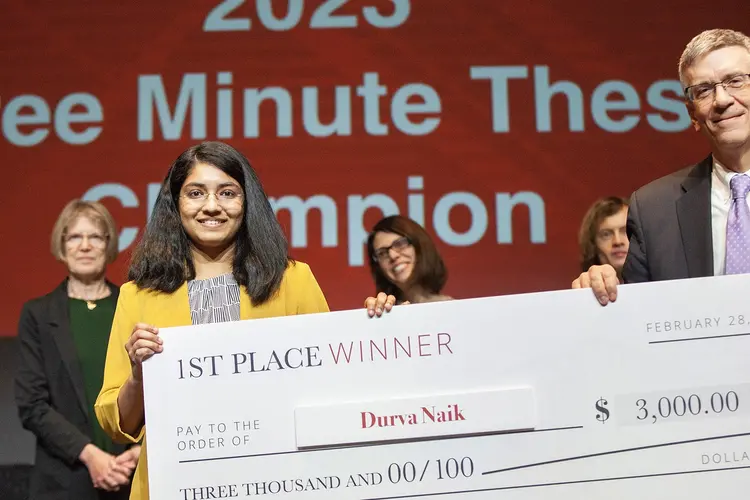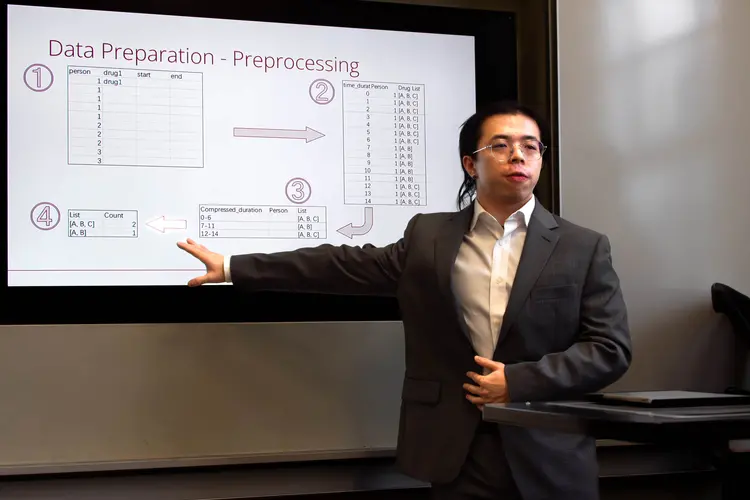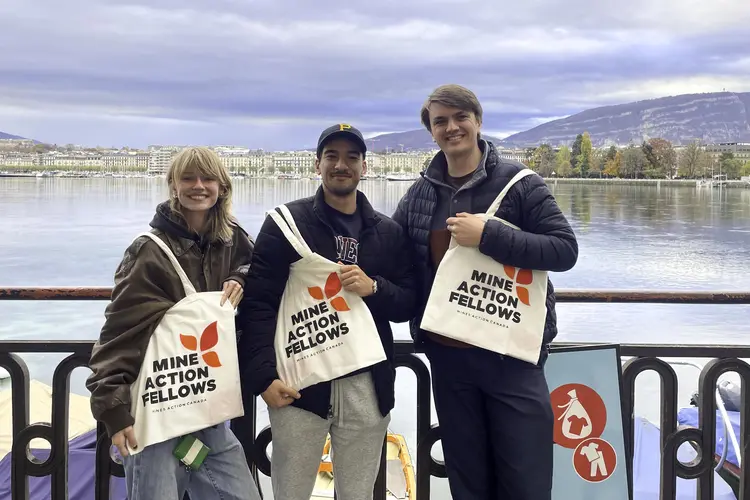Doctoral Students Take On 3MT Challenge
Media Inquiries
Carnegie Mellon University doctoral students will challenge each other — and the clock — as they captivate their audience and explain complex research in three minutes or less during this year's Three Minute Thesis (3MT). Nine finalists will compete in the 3MT Championship(opens in new window) on Thursday, March 14, at 6 p.m. in the Tepper School of Business’ Simmons Auditorium A. A livestream will also be available.
3MT is a celebration of research that challenges Ph.D. students to present a compelling oration on their thesis and its significance in language that anyone can understand. Developed by The University of Queensland in Australia, the competition was brought to Pittsburgh by Helen and Henry Posner, Jr. Dean of Libraries Keith Webster(opens in new window) in 2013. Since then, CMU doctoral candidates have joined students at over 900 universities across more than 85 countries worldwide in sharing their work with broad audiences through the competition.
Finalist Vishnu Raghuraman was encouraged to participate in 3MT by one of last year’s finalists(opens in new window), fellow Department of Physics(opens in new window) student Byron Daniel. In his presentation, he’ll share his work writing software that can simulate real materials on an atomic level.
Raghuraman’s research specifically looks at a class of materials called multiprincipal element alloys, which are amalgams containing several elements in roughly equal concentrations. These materials have many useful properties such as high strength, high durability and low density, and they could potentially replace existing alloys such as steel.
“However, there are billions of such alloys, making it impractical to physically make each one in a lab and test it out,” Raghuraman said. “Computer simulation is hence necessary to screen these possibilities, making our work important.”
He said he feels a responsibility to be able to communicate his research with a general audience, and 3MT provides a valuable opportunity for him to practice.
“A lot of scientific work is supported by government agencies like the NSF and DOE, which means that they are funded by taxpayer dollars. I think it is the duty of scientists to explain how they have utilized that support to the taxpayers,” he explained. “Additionally, in order to keep a research field active, there has to be a healthy influx of people who want to join the field. This will only happen if the existing researchers actively market their work.”
Join Vishnu Raghuraman of @Physics_CMU @CmuScience as he presents his #ThreeMinuteThesis to @CarnegieMellon at the 2024 #3MTCMU championship. Cheer him on at Simmons Auditorium A, @TepperCMU or via livestream on March 14th at 6pm. Register to attend: https://t.co/5BTvaBL8c2 pic.twitter.com/ubkZht7ZlZ
— CMU Libraries (@CMULibraries) March 6, 2024
For finalist Nicole C. Auvil, effective and understandable science communication can encourage participation in science and prevent the spread of misinformation. The Mellon College of Science(opens in new window) student, who is studying chemistry(opens in new window), said that explaining research in simple terms has the power to help people understand the world around them.
“Doing science without being able to communicate your research is like baking a cake for a party and leaving it in the refrigerator instead of serving it,” she said. “You wouldn't expect your partygoers to know where the kitchen is, walk to it, open the fridge, remove the cake, and cut themselves a slice — just like how we can't expect the general public to go out of their way to learn and understand science on their own. If we serve it to them pre-sliced and on a plate, maybe they'll indulge.”
Auvil’s research(opens in new window) focuses on a chemical analysis instrument known as a mass spectrometer. Typically, samples need to be prepared in a specific way for the instrument to reveal what chemicals are present in the sample. To save time and keep samples intact, Auvil helped develop an attachment that allows a mass spectrometer to act like an electronic nose — the Super Sniffer. By holding up a sample to the attachment, the mass spectrometer is able to detect chemicals emanating from it similar to the way a nose can detect chemicals in the air.
She plans to recruit friends and family to help her practice for the championship.
“While it may not be obvious to me, the nonchemists in my life will quickly be able to identify if I haven't explained a particular topic clearly enough for anyone to understand!” she said.
Finalist Benjamin Glaser broke his talk into two categories in order to effectively communicate his work: methods and materials. The Materials Science and Engineering(opens in new window) student is working with an advanced material discovery model, and using it to design new aluminum alloys with high temperature strength and stability. This would make an alloy usable in applications like the pistons in an internal combustion engine or the intake fans on an aircraft’s engine.
Glaser’s goal is to create a material viable for additive manufacturing — the 3D printing of metals. This is a notoriously difficult environment, he said, as only a small fraction of all aluminum alloys are printable; and even fewer are high strength. He also wants to make an alloy with low cost and low emissions to meet sustainability goals.
Years ago, a writing class taught Glaser that if a scientist can’t communicate their research effectively, no one will be able to use it, no matter how useful the discovery is. He has channeled this lesson into his presentation.
“If I discover an approach for new material development, I need to be able to convey this method to the rest of the field,” he explained. “If I create a new high-performance alloy, I need to present how it is made and how it works, if I want it to be bought and used in industry. If I fail to do either of these, nothing I’ve done will have any impact.”
At the championship, CMU leadership and alumni judges will choose the first-, second- and third-place winners to receive $3,000, $2,000 and $1,000, respectively. Two audience-selected winners will receive $500 for the People’s Choice Award and $750 for the Alumni Award.
Alumni can watch the competition via the livestream, where they can vote to select the Alumni Award winner.
The Three Minute Thesis Championship is free of charge and open to the public. Registration is required(opens in new window) to attend the in-person event or to view the livestream.
Join Benjamin Glaser of @cmu_mse @CMUEngineering as he presents his #ThreeMinuteThesis to @CarnegieMellon at the 2024 #3MTCMU championship. Cheer him on at Simmons Auditorium A, @TepperCMU or via livestream on March 14th at 6pm. Register to attend: https://t.co/5BTvaBLG1A pic.twitter.com/EfVGjUxvLU
— CMU Libraries (@CMULibraries) March 5, 2024





